Economic, Social, and Environmental Analysis of the Olympic Games
VerifiedAdded on 2023/01/05
|9
|2690
|48
Report
AI Summary
This report analyzes the multifaceted impacts of hosting the Olympic Games. It begins with an introduction to the Olympics and the bidding process, followed by a detailed examination of the economic impacts, including infrastructure investments, job creation, and potential debts incurred by host cities. The report then explores the environmental perspective, discussing sustainability, renewable resources, pollution, and waste management. It also addresses the social impacts, such as skill development, social capital, urban regeneration, and potential negative consequences like displacement and social housing. The conclusion summarizes the findings, highlighting the financial risks and the benefits of international recognition. The report emphasizes the importance of careful planning and budgeting for cities bidding to host the Olympics and provides recommendations to maximize the benefits and minimize the challenges associated with hosting such a large-scale event.

The government is bidding to host the
Olympics you have been asked to
analyse the various impacts of hosting
such an event Use this analysis to
recommendation
Olympics you have been asked to
analyse the various impacts of hosting
such an event Use this analysis to
recommendation
Paraphrase This Document
Need a fresh take? Get an instant paraphrase of this document with our AI Paraphraser

Table of Contents
INTRODUCTION...........................................................................................................................3
ANALYSIS......................................................................................................................................3
THE ECONOMIC IMPACTS:........................................................................................................4
THE IMPACTS FROM ENVIRONMEMTAL PERSPECTIVE:..................................................4
THE IMPACT FROM SOCIAL PERSPECTIVE:..........................................................................5
CONCLUSION................................................................................................................................7
RECOMMENDATION...................................................................................................................7
REFERENCES................................................................................................................................9
Books and Journals..........................................................................................................................9
INTRODUCTION...........................................................................................................................3
ANALYSIS......................................................................................................................................3
THE ECONOMIC IMPACTS:........................................................................................................4
THE IMPACTS FROM ENVIRONMEMTAL PERSPECTIVE:..................................................4
THE IMPACT FROM SOCIAL PERSPECTIVE:..........................................................................5
CONCLUSION................................................................................................................................7
RECOMMENDATION...................................................................................................................7
REFERENCES................................................................................................................................9
Books and Journals..........................................................................................................................9
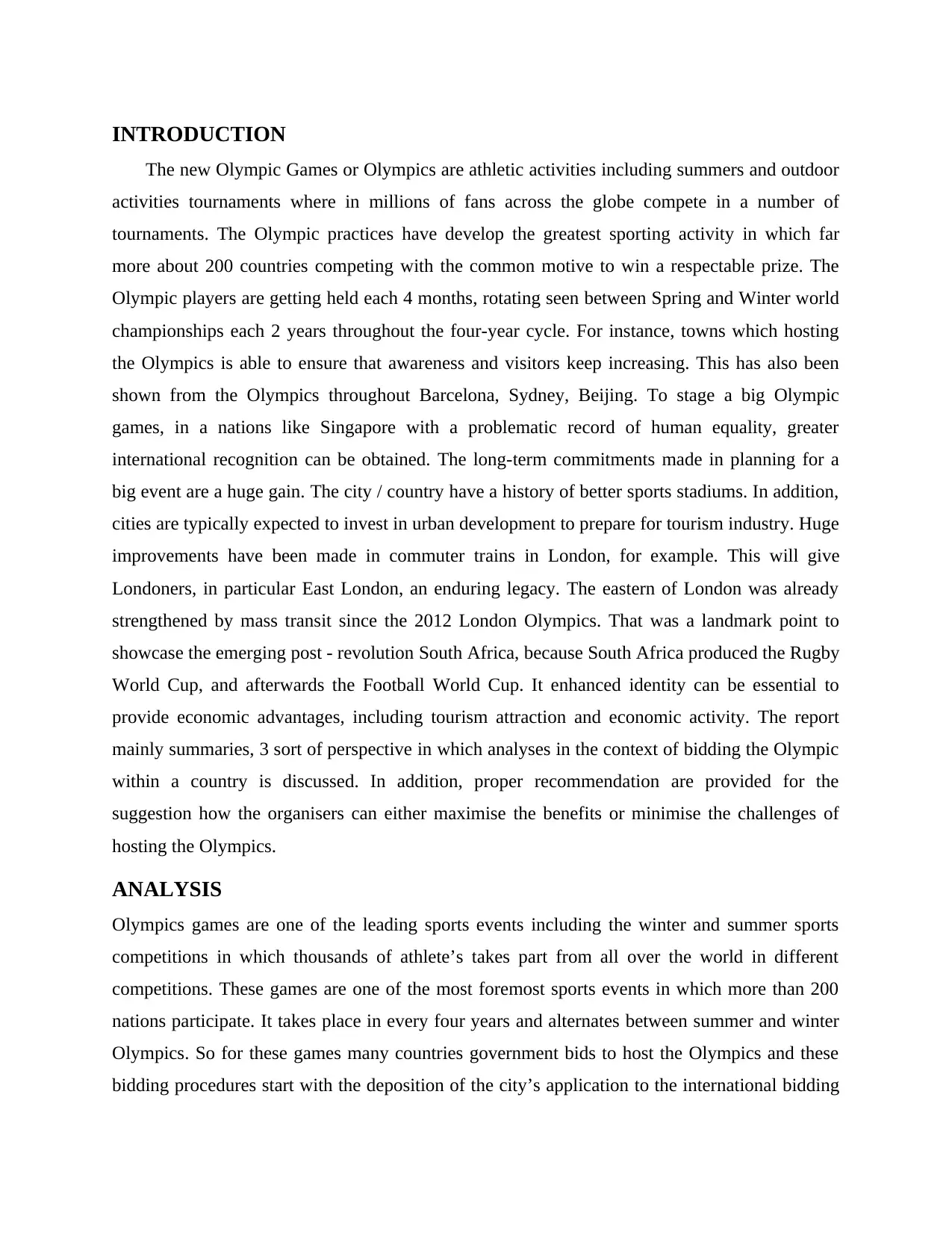
INTRODUCTION
The new Olympic Games or Olympics are athletic activities including summers and outdoor
activities tournaments where in millions of fans across the globe compete in a number of
tournaments. The Olympic practices have develop the greatest sporting activity in which far
more about 200 countries competing with the common motive to win a respectable prize. The
Olympic players are getting held each 4 months, rotating seen between Spring and Winter world
championships each 2 years throughout the four-year cycle. For instance, towns which hosting
the Olympics is able to ensure that awareness and visitors keep increasing. This has also been
shown from the Olympics throughout Barcelona, Sydney, Beijing. To stage a big Olympic
games, in a nations like Singapore with a problematic record of human equality, greater
international recognition can be obtained. The long-term commitments made in planning for a
big event are a huge gain. The city / country have a history of better sports stadiums. In addition,
cities are typically expected to invest in urban development to prepare for tourism industry. Huge
improvements have been made in commuter trains in London, for example. This will give
Londoners, in particular East London, an enduring legacy. The eastern of London was already
strengthened by mass transit since the 2012 London Olympics. That was a landmark point to
showcase the emerging post - revolution South Africa, because South Africa produced the Rugby
World Cup, and afterwards the Football World Cup. It enhanced identity can be essential to
provide economic advantages, including tourism attraction and economic activity. The report
mainly summaries, 3 sort of perspective in which analyses in the context of bidding the Olympic
within a country is discussed. In addition, proper recommendation are provided for the
suggestion how the organisers can either maximise the benefits or minimise the challenges of
hosting the Olympics.
ANALYSIS
Olympics games are one of the leading sports events including the winter and summer sports
competitions in which thousands of athlete’s takes part from all over the world in different
competitions. These games are one of the most foremost sports events in which more than 200
nations participate. It takes place in every four years and alternates between summer and winter
Olympics. So for these games many countries government bids to host the Olympics and these
bidding procedures start with the deposition of the city’s application to the international bidding
The new Olympic Games or Olympics are athletic activities including summers and outdoor
activities tournaments where in millions of fans across the globe compete in a number of
tournaments. The Olympic practices have develop the greatest sporting activity in which far
more about 200 countries competing with the common motive to win a respectable prize. The
Olympic players are getting held each 4 months, rotating seen between Spring and Winter world
championships each 2 years throughout the four-year cycle. For instance, towns which hosting
the Olympics is able to ensure that awareness and visitors keep increasing. This has also been
shown from the Olympics throughout Barcelona, Sydney, Beijing. To stage a big Olympic
games, in a nations like Singapore with a problematic record of human equality, greater
international recognition can be obtained. The long-term commitments made in planning for a
big event are a huge gain. The city / country have a history of better sports stadiums. In addition,
cities are typically expected to invest in urban development to prepare for tourism industry. Huge
improvements have been made in commuter trains in London, for example. This will give
Londoners, in particular East London, an enduring legacy. The eastern of London was already
strengthened by mass transit since the 2012 London Olympics. That was a landmark point to
showcase the emerging post - revolution South Africa, because South Africa produced the Rugby
World Cup, and afterwards the Football World Cup. It enhanced identity can be essential to
provide economic advantages, including tourism attraction and economic activity. The report
mainly summaries, 3 sort of perspective in which analyses in the context of bidding the Olympic
within a country is discussed. In addition, proper recommendation are provided for the
suggestion how the organisers can either maximise the benefits or minimise the challenges of
hosting the Olympics.
ANALYSIS
Olympics games are one of the leading sports events including the winter and summer sports
competitions in which thousands of athlete’s takes part from all over the world in different
competitions. These games are one of the most foremost sports events in which more than 200
nations participate. It takes place in every four years and alternates between summer and winter
Olympics. So for these games many countries government bids to host the Olympics and these
bidding procedures start with the deposition of the city’s application to the international bidding
⊘ This is a preview!⊘
Do you want full access?
Subscribe today to unlock all pages.

Trusted by 1+ million students worldwide
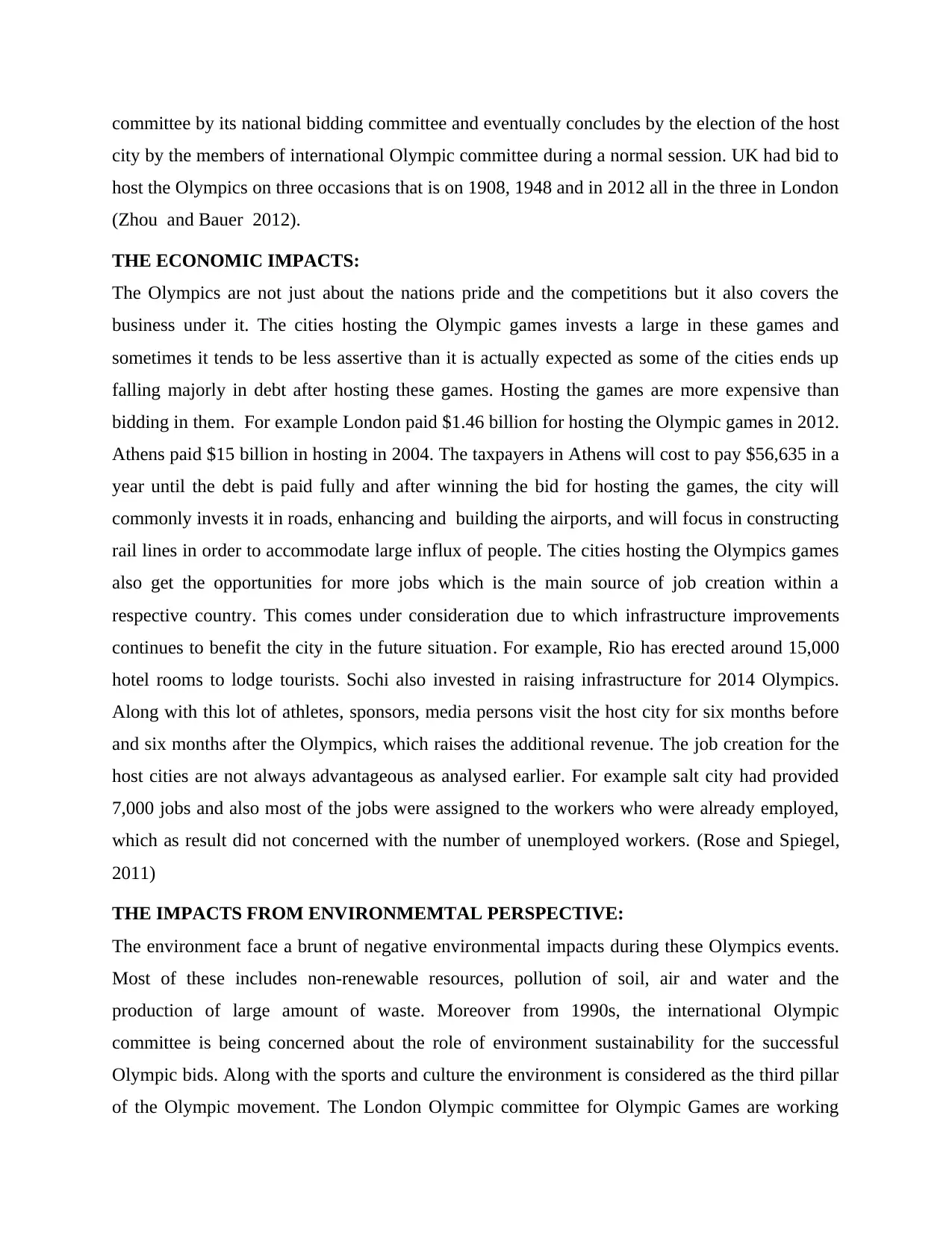
committee by its national bidding committee and eventually concludes by the election of the host
city by the members of international Olympic committee during a normal session. UK had bid to
host the Olympics on three occasions that is on 1908, 1948 and in 2012 all in the three in London
(Zhou and Bauer 2012).
THE ECONOMIC IMPACTS:
The Olympics are not just about the nations pride and the competitions but it also covers the
business under it. The cities hosting the Olympic games invests a large in these games and
sometimes it tends to be less assertive than it is actually expected as some of the cities ends up
falling majorly in debt after hosting these games. Hosting the games are more expensive than
bidding in them. For example London paid $1.46 billion for hosting the Olympic games in 2012.
Athens paid $15 billion in hosting in 2004. The taxpayers in Athens will cost to pay $56,635 in a
year until the debt is paid fully and after winning the bid for hosting the games, the city will
commonly invests it in roads, enhancing and building the airports, and will focus in constructing
rail lines in order to accommodate large influx of people. The cities hosting the Olympics games
also get the opportunities for more jobs which is the main source of job creation within a
respective country. This comes under consideration due to which infrastructure improvements
continues to benefit the city in the future situation. For example, Rio has erected around 15,000
hotel rooms to lodge tourists. Sochi also invested in raising infrastructure for 2014 Olympics.
Along with this lot of athletes, sponsors, media persons visit the host city for six months before
and six months after the Olympics, which raises the additional revenue. The job creation for the
host cities are not always advantageous as analysed earlier. For example salt city had provided
7,000 jobs and also most of the jobs were assigned to the workers who were already employed,
which as result did not concerned with the number of unemployed workers. (Rose and Spiegel,
2011)
THE IMPACTS FROM ENVIRONMEMTAL PERSPECTIVE:
The environment face a brunt of negative environmental impacts during these Olympics events.
Most of these includes non-renewable resources, pollution of soil, air and water and the
production of large amount of waste. Moreover from 1990s, the international Olympic
committee is being concerned about the role of environment sustainability for the successful
Olympic bids. Along with the sports and culture the environment is considered as the third pillar
of the Olympic movement. The London Olympic committee for Olympic Games are working
city by the members of international Olympic committee during a normal session. UK had bid to
host the Olympics on three occasions that is on 1908, 1948 and in 2012 all in the three in London
(Zhou and Bauer 2012).
THE ECONOMIC IMPACTS:
The Olympics are not just about the nations pride and the competitions but it also covers the
business under it. The cities hosting the Olympic games invests a large in these games and
sometimes it tends to be less assertive than it is actually expected as some of the cities ends up
falling majorly in debt after hosting these games. Hosting the games are more expensive than
bidding in them. For example London paid $1.46 billion for hosting the Olympic games in 2012.
Athens paid $15 billion in hosting in 2004. The taxpayers in Athens will cost to pay $56,635 in a
year until the debt is paid fully and after winning the bid for hosting the games, the city will
commonly invests it in roads, enhancing and building the airports, and will focus in constructing
rail lines in order to accommodate large influx of people. The cities hosting the Olympics games
also get the opportunities for more jobs which is the main source of job creation within a
respective country. This comes under consideration due to which infrastructure improvements
continues to benefit the city in the future situation. For example, Rio has erected around 15,000
hotel rooms to lodge tourists. Sochi also invested in raising infrastructure for 2014 Olympics.
Along with this lot of athletes, sponsors, media persons visit the host city for six months before
and six months after the Olympics, which raises the additional revenue. The job creation for the
host cities are not always advantageous as analysed earlier. For example salt city had provided
7,000 jobs and also most of the jobs were assigned to the workers who were already employed,
which as result did not concerned with the number of unemployed workers. (Rose and Spiegel,
2011)
THE IMPACTS FROM ENVIRONMEMTAL PERSPECTIVE:
The environment face a brunt of negative environmental impacts during these Olympics events.
Most of these includes non-renewable resources, pollution of soil, air and water and the
production of large amount of waste. Moreover from 1990s, the international Olympic
committee is being concerned about the role of environment sustainability for the successful
Olympic bids. Along with the sports and culture the environment is considered as the third pillar
of the Olympic movement. The London Olympic committee for Olympic Games are working
Paraphrase This Document
Need a fresh take? Get an instant paraphrase of this document with our AI Paraphraser
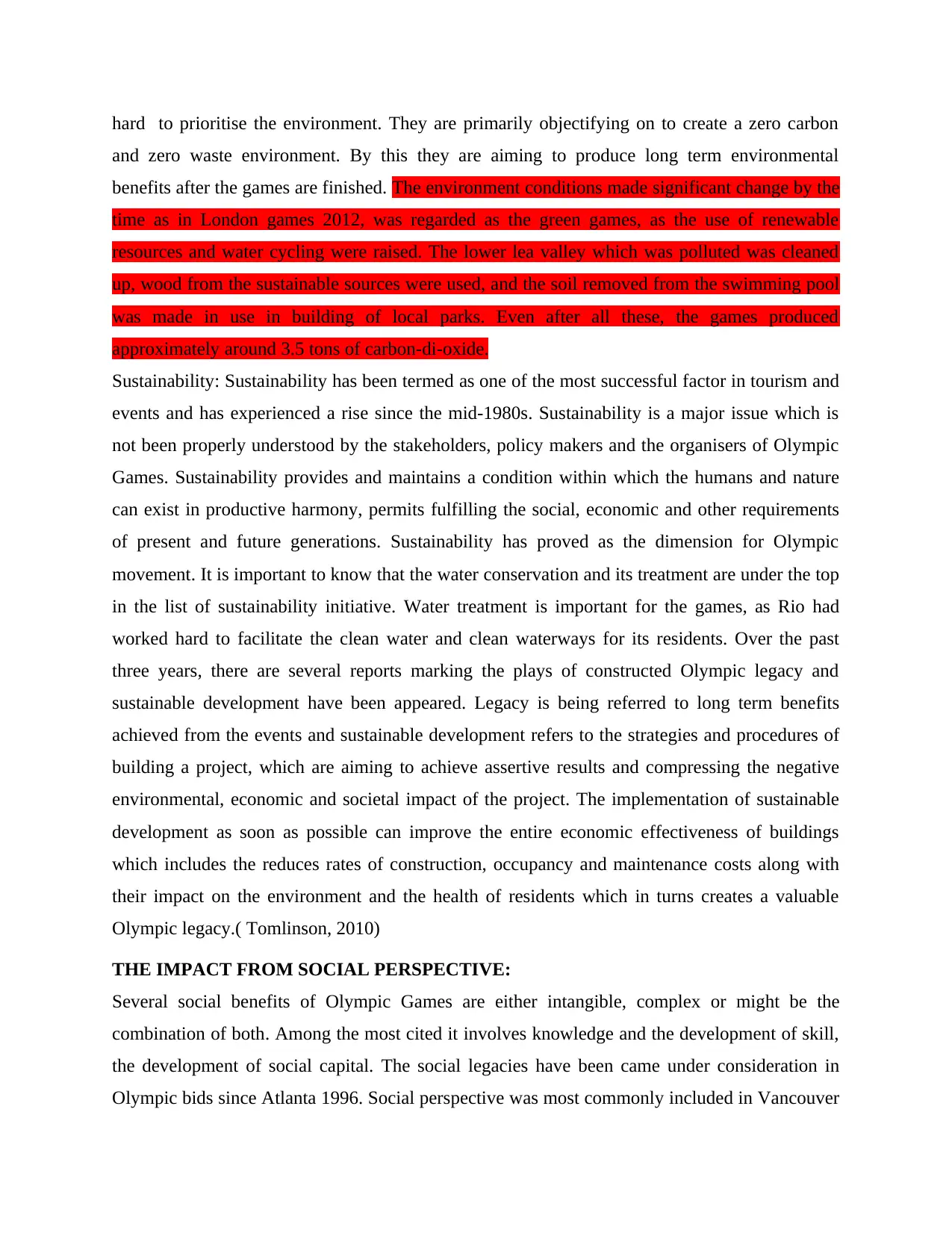
hard to prioritise the environment. They are primarily objectifying on to create a zero carbon
and zero waste environment. By this they are aiming to produce long term environmental
benefits after the games are finished. The environment conditions made significant change by the
time as in London games 2012, was regarded as the green games, as the use of renewable
resources and water cycling were raised. The lower lea valley which was polluted was cleaned
up, wood from the sustainable sources were used, and the soil removed from the swimming pool
was made in use in building of local parks. Even after all these, the games produced
approximately around 3.5 tons of carbon-di-oxide.
Sustainability: Sustainability has been termed as one of the most successful factor in tourism and
events and has experienced a rise since the mid-1980s. Sustainability is a major issue which is
not been properly understood by the stakeholders, policy makers and the organisers of Olympic
Games. Sustainability provides and maintains a condition within which the humans and nature
can exist in productive harmony, permits fulfilling the social, economic and other requirements
of present and future generations. Sustainability has proved as the dimension for Olympic
movement. It is important to know that the water conservation and its treatment are under the top
in the list of sustainability initiative. Water treatment is important for the games, as Rio had
worked hard to facilitate the clean water and clean waterways for its residents. Over the past
three years, there are several reports marking the plays of constructed Olympic legacy and
sustainable development have been appeared. Legacy is being referred to long term benefits
achieved from the events and sustainable development refers to the strategies and procedures of
building a project, which are aiming to achieve assertive results and compressing the negative
environmental, economic and societal impact of the project. The implementation of sustainable
development as soon as possible can improve the entire economic effectiveness of buildings
which includes the reduces rates of construction, occupancy and maintenance costs along with
their impact on the environment and the health of residents which in turns creates a valuable
Olympic legacy.( Tomlinson, 2010)
THE IMPACT FROM SOCIAL PERSPECTIVE:
Several social benefits of Olympic Games are either intangible, complex or might be the
combination of both. Among the most cited it involves knowledge and the development of skill,
the development of social capital. The social legacies have been came under consideration in
Olympic bids since Atlanta 1996. Social perspective was most commonly included in Vancouver
and zero waste environment. By this they are aiming to produce long term environmental
benefits after the games are finished. The environment conditions made significant change by the
time as in London games 2012, was regarded as the green games, as the use of renewable
resources and water cycling were raised. The lower lea valley which was polluted was cleaned
up, wood from the sustainable sources were used, and the soil removed from the swimming pool
was made in use in building of local parks. Even after all these, the games produced
approximately around 3.5 tons of carbon-di-oxide.
Sustainability: Sustainability has been termed as one of the most successful factor in tourism and
events and has experienced a rise since the mid-1980s. Sustainability is a major issue which is
not been properly understood by the stakeholders, policy makers and the organisers of Olympic
Games. Sustainability provides and maintains a condition within which the humans and nature
can exist in productive harmony, permits fulfilling the social, economic and other requirements
of present and future generations. Sustainability has proved as the dimension for Olympic
movement. It is important to know that the water conservation and its treatment are under the top
in the list of sustainability initiative. Water treatment is important for the games, as Rio had
worked hard to facilitate the clean water and clean waterways for its residents. Over the past
three years, there are several reports marking the plays of constructed Olympic legacy and
sustainable development have been appeared. Legacy is being referred to long term benefits
achieved from the events and sustainable development refers to the strategies and procedures of
building a project, which are aiming to achieve assertive results and compressing the negative
environmental, economic and societal impact of the project. The implementation of sustainable
development as soon as possible can improve the entire economic effectiveness of buildings
which includes the reduces rates of construction, occupancy and maintenance costs along with
their impact on the environment and the health of residents which in turns creates a valuable
Olympic legacy.( Tomlinson, 2010)
THE IMPACT FROM SOCIAL PERSPECTIVE:
Several social benefits of Olympic Games are either intangible, complex or might be the
combination of both. Among the most cited it involves knowledge and the development of skill,
the development of social capital. The social legacies have been came under consideration in
Olympic bids since Atlanta 1996. Social perspective was most commonly included in Vancouver
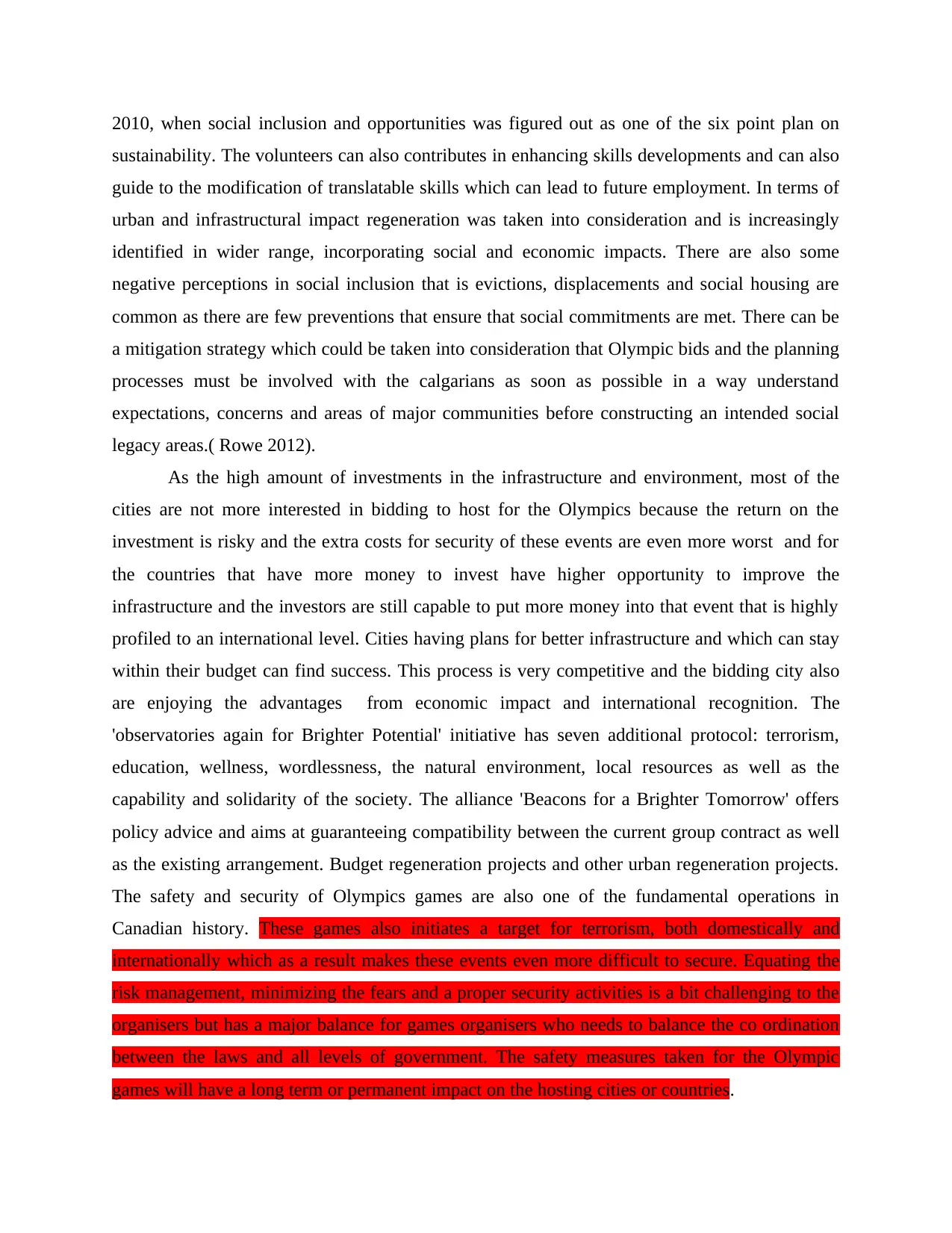
2010, when social inclusion and opportunities was figured out as one of the six point plan on
sustainability. The volunteers can also contributes in enhancing skills developments and can also
guide to the modification of translatable skills which can lead to future employment. In terms of
urban and infrastructural impact regeneration was taken into consideration and is increasingly
identified in wider range, incorporating social and economic impacts. There are also some
negative perceptions in social inclusion that is evictions, displacements and social housing are
common as there are few preventions that ensure that social commitments are met. There can be
a mitigation strategy which could be taken into consideration that Olympic bids and the planning
processes must be involved with the calgarians as soon as possible in a way understand
expectations, concerns and areas of major communities before constructing an intended social
legacy areas.( Rowe 2012).
As the high amount of investments in the infrastructure and environment, most of the
cities are not more interested in bidding to host for the Olympics because the return on the
investment is risky and the extra costs for security of these events are even more worst and for
the countries that have more money to invest have higher opportunity to improve the
infrastructure and the investors are still capable to put more money into that event that is highly
profiled to an international level. Cities having plans for better infrastructure and which can stay
within their budget can find success. This process is very competitive and the bidding city also
are enjoying the advantages from economic impact and international recognition. The
'observatories again for Brighter Potential' initiative has seven additional protocol: terrorism,
education, wellness, wordlessness, the natural environment, local resources as well as the
capability and solidarity of the society. The alliance 'Beacons for a Brighter Tomorrow' offers
policy advice and aims at guaranteeing compatibility between the current group contract as well
as the existing arrangement. Budget regeneration projects and other urban regeneration projects.
The safety and security of Olympics games are also one of the fundamental operations in
Canadian history. These games also initiates a target for terrorism, both domestically and
internationally which as a result makes these events even more difficult to secure. Equating the
risk management, minimizing the fears and a proper security activities is a bit challenging to the
organisers but has a major balance for games organisers who needs to balance the co ordination
between the laws and all levels of government. The safety measures taken for the Olympic
games will have a long term or permanent impact on the hosting cities or countries.
sustainability. The volunteers can also contributes in enhancing skills developments and can also
guide to the modification of translatable skills which can lead to future employment. In terms of
urban and infrastructural impact regeneration was taken into consideration and is increasingly
identified in wider range, incorporating social and economic impacts. There are also some
negative perceptions in social inclusion that is evictions, displacements and social housing are
common as there are few preventions that ensure that social commitments are met. There can be
a mitigation strategy which could be taken into consideration that Olympic bids and the planning
processes must be involved with the calgarians as soon as possible in a way understand
expectations, concerns and areas of major communities before constructing an intended social
legacy areas.( Rowe 2012).
As the high amount of investments in the infrastructure and environment, most of the
cities are not more interested in bidding to host for the Olympics because the return on the
investment is risky and the extra costs for security of these events are even more worst and for
the countries that have more money to invest have higher opportunity to improve the
infrastructure and the investors are still capable to put more money into that event that is highly
profiled to an international level. Cities having plans for better infrastructure and which can stay
within their budget can find success. This process is very competitive and the bidding city also
are enjoying the advantages from economic impact and international recognition. The
'observatories again for Brighter Potential' initiative has seven additional protocol: terrorism,
education, wellness, wordlessness, the natural environment, local resources as well as the
capability and solidarity of the society. The alliance 'Beacons for a Brighter Tomorrow' offers
policy advice and aims at guaranteeing compatibility between the current group contract as well
as the existing arrangement. Budget regeneration projects and other urban regeneration projects.
The safety and security of Olympics games are also one of the fundamental operations in
Canadian history. These games also initiates a target for terrorism, both domestically and
internationally which as a result makes these events even more difficult to secure. Equating the
risk management, minimizing the fears and a proper security activities is a bit challenging to the
organisers but has a major balance for games organisers who needs to balance the co ordination
between the laws and all levels of government. The safety measures taken for the Olympic
games will have a long term or permanent impact on the hosting cities or countries.
⊘ This is a preview!⊘
Do you want full access?
Subscribe today to unlock all pages.

Trusted by 1+ million students worldwide
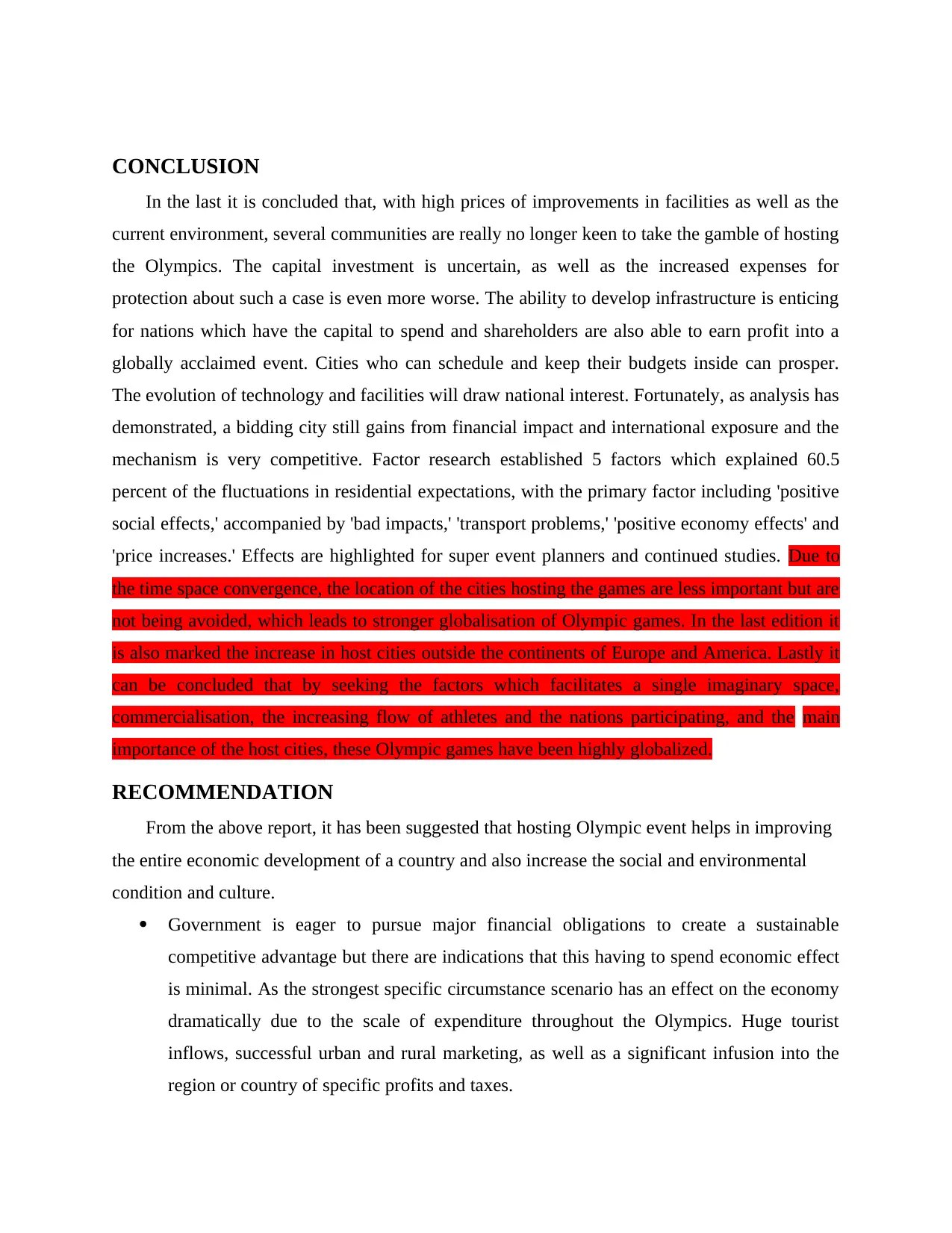
CONCLUSION
In the last it is concluded that, with high prices of improvements in facilities as well as the
current environment, several communities are really no longer keen to take the gamble of hosting
the Olympics. The capital investment is uncertain, as well as the increased expenses for
protection about such a case is even more worse. The ability to develop infrastructure is enticing
for nations which have the capital to spend and shareholders are also able to earn profit into a
globally acclaimed event. Cities who can schedule and keep their budgets inside can prosper.
The evolution of technology and facilities will draw national interest. Fortunately, as analysis has
demonstrated, a bidding city still gains from financial impact and international exposure and the
mechanism is very competitive. Factor research established 5 factors which explained 60.5
percent of the fluctuations in residential expectations, with the primary factor including 'positive
social effects,' accompanied by 'bad impacts,' 'transport problems,' 'positive economy effects' and
'price increases.' Effects are highlighted for super event planners and continued studies. Due to
the time space convergence, the location of the cities hosting the games are less important but are
not being avoided, which leads to stronger globalisation of Olympic games. In the last edition it
is also marked the increase in host cities outside the continents of Europe and America. Lastly it
can be concluded that by seeking the factors which facilitates a single imaginary space,
commercialisation, the increasing flow of athletes and the nations participating, and the main
importance of the host cities, these Olympic games have been highly globalized.
RECOMMENDATION
From the above report, it has been suggested that hosting Olympic event helps in improving
the entire economic development of a country and also increase the social and environmental
condition and culture.
Government is eager to pursue major financial obligations to create a sustainable
competitive advantage but there are indications that this having to spend economic effect
is minimal. As the strongest specific circumstance scenario has an effect on the economy
dramatically due to the scale of expenditure throughout the Olympics. Huge tourist
inflows, successful urban and rural marketing, as well as a significant infusion into the
region or country of specific profits and taxes.
In the last it is concluded that, with high prices of improvements in facilities as well as the
current environment, several communities are really no longer keen to take the gamble of hosting
the Olympics. The capital investment is uncertain, as well as the increased expenses for
protection about such a case is even more worse. The ability to develop infrastructure is enticing
for nations which have the capital to spend and shareholders are also able to earn profit into a
globally acclaimed event. Cities who can schedule and keep their budgets inside can prosper.
The evolution of technology and facilities will draw national interest. Fortunately, as analysis has
demonstrated, a bidding city still gains from financial impact and international exposure and the
mechanism is very competitive. Factor research established 5 factors which explained 60.5
percent of the fluctuations in residential expectations, with the primary factor including 'positive
social effects,' accompanied by 'bad impacts,' 'transport problems,' 'positive economy effects' and
'price increases.' Effects are highlighted for super event planners and continued studies. Due to
the time space convergence, the location of the cities hosting the games are less important but are
not being avoided, which leads to stronger globalisation of Olympic games. In the last edition it
is also marked the increase in host cities outside the continents of Europe and America. Lastly it
can be concluded that by seeking the factors which facilitates a single imaginary space,
commercialisation, the increasing flow of athletes and the nations participating, and the main
importance of the host cities, these Olympic games have been highly globalized.
RECOMMENDATION
From the above report, it has been suggested that hosting Olympic event helps in improving
the entire economic development of a country and also increase the social and environmental
condition and culture.
Government is eager to pursue major financial obligations to create a sustainable
competitive advantage but there are indications that this having to spend economic effect
is minimal. As the strongest specific circumstance scenario has an effect on the economy
dramatically due to the scale of expenditure throughout the Olympics. Huge tourist
inflows, successful urban and rural marketing, as well as a significant infusion into the
region or country of specific profits and taxes.
Paraphrase This Document
Need a fresh take? Get an instant paraphrase of this document with our AI Paraphraser
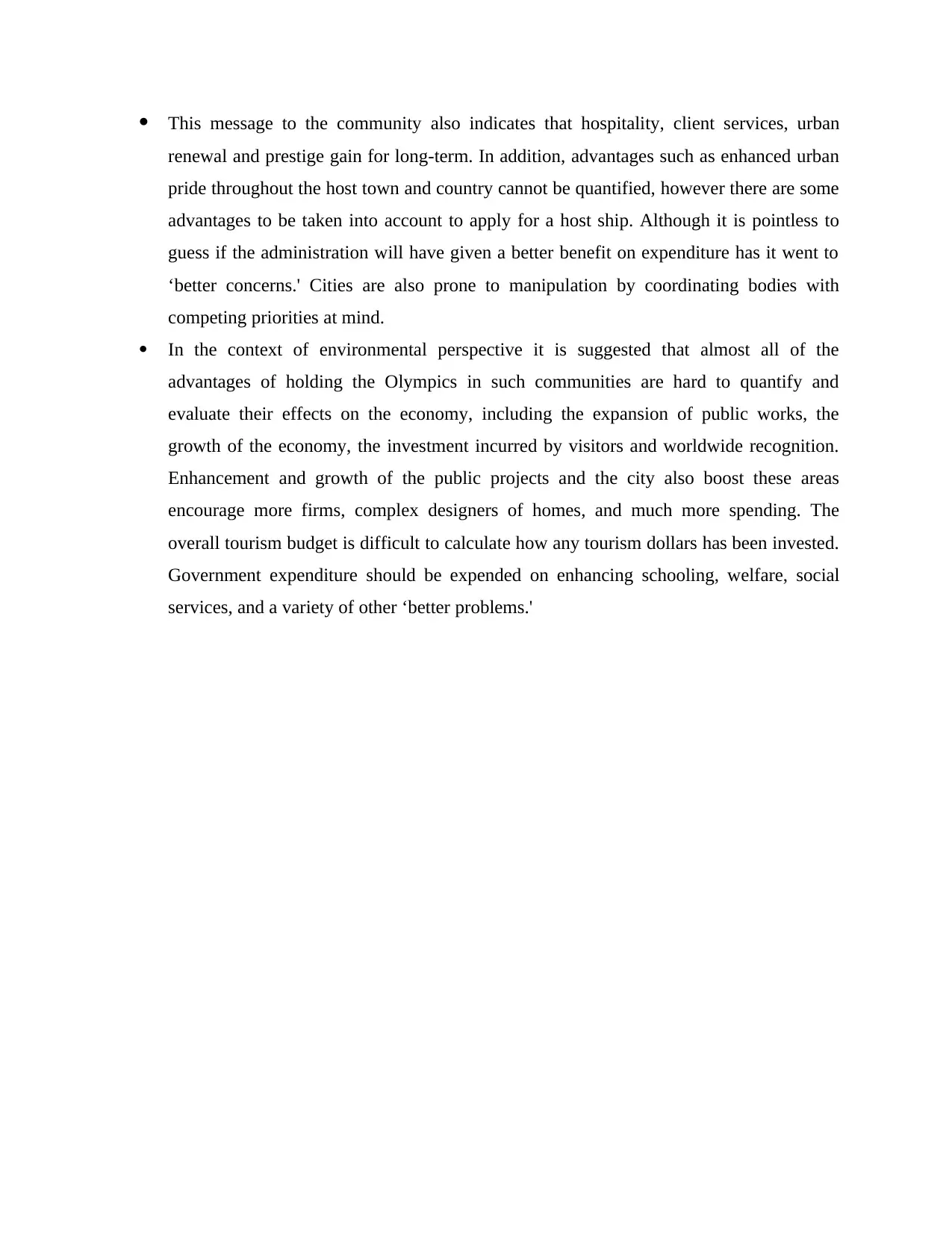
This message to the community also indicates that hospitality, client services, urban
renewal and prestige gain for long-term. In addition, advantages such as enhanced urban
pride throughout the host town and country cannot be quantified, however there are some
advantages to be taken into account to apply for a host ship. Although it is pointless to
guess if the administration will have given a better benefit on expenditure has it went to
‘better concerns.' Cities are also prone to manipulation by coordinating bodies with
competing priorities at mind.
In the context of environmental perspective it is suggested that almost all of the
advantages of holding the Olympics in such communities are hard to quantify and
evaluate their effects on the economy, including the expansion of public works, the
growth of the economy, the investment incurred by visitors and worldwide recognition.
Enhancement and growth of the public projects and the city also boost these areas
encourage more firms, complex designers of homes, and much more spending. The
overall tourism budget is difficult to calculate how any tourism dollars has been invested.
Government expenditure should be expended on enhancing schooling, welfare, social
services, and a variety of other ‘better problems.'
renewal and prestige gain for long-term. In addition, advantages such as enhanced urban
pride throughout the host town and country cannot be quantified, however there are some
advantages to be taken into account to apply for a host ship. Although it is pointless to
guess if the administration will have given a better benefit on expenditure has it went to
‘better concerns.' Cities are also prone to manipulation by coordinating bodies with
competing priorities at mind.
In the context of environmental perspective it is suggested that almost all of the
advantages of holding the Olympics in such communities are hard to quantify and
evaluate their effects on the economy, including the expansion of public works, the
growth of the economy, the investment incurred by visitors and worldwide recognition.
Enhancement and growth of the public projects and the city also boost these areas
encourage more firms, complex designers of homes, and much more spending. The
overall tourism budget is difficult to calculate how any tourism dollars has been invested.
Government expenditure should be expended on enhancing schooling, welfare, social
services, and a variety of other ‘better problems.'
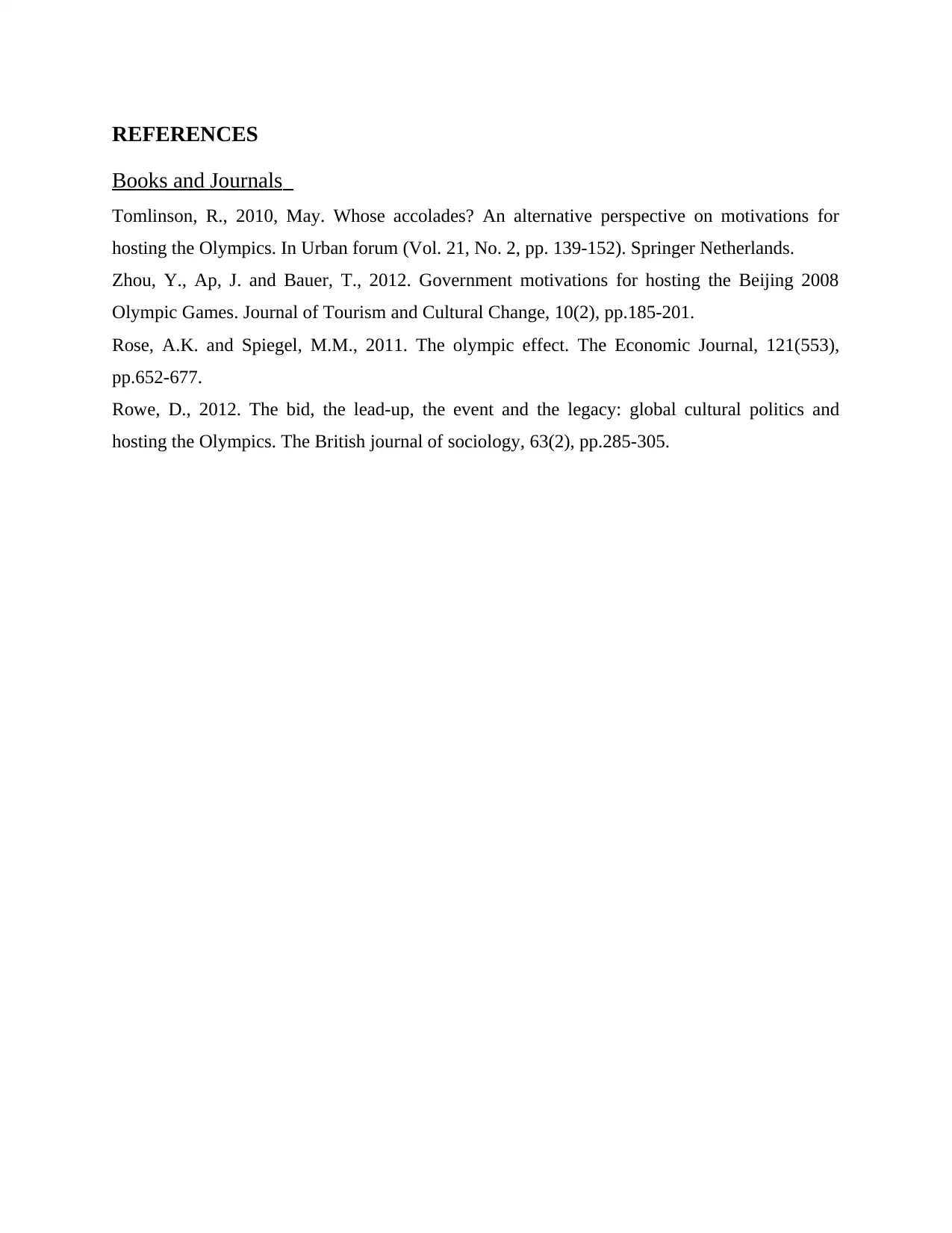
REFERENCES
Books and Journals
Tomlinson, R., 2010, May. Whose accolades? An alternative perspective on motivations for
hosting the Olympics. In Urban forum (Vol. 21, No. 2, pp. 139-152). Springer Netherlands.
Zhou, Y., Ap, J. and Bauer, T., 2012. Government motivations for hosting the Beijing 2008
Olympic Games. Journal of Tourism and Cultural Change, 10(2), pp.185-201.
Rose, A.K. and Spiegel, M.M., 2011. The olympic effect. The Economic Journal, 121(553),
pp.652-677.
Rowe, D., 2012. The bid, the lead‐up, the event and the legacy: global cultural politics and
hosting the Olympics. The British journal of sociology, 63(2), pp.285-305.
Books and Journals
Tomlinson, R., 2010, May. Whose accolades? An alternative perspective on motivations for
hosting the Olympics. In Urban forum (Vol. 21, No. 2, pp. 139-152). Springer Netherlands.
Zhou, Y., Ap, J. and Bauer, T., 2012. Government motivations for hosting the Beijing 2008
Olympic Games. Journal of Tourism and Cultural Change, 10(2), pp.185-201.
Rose, A.K. and Spiegel, M.M., 2011. The olympic effect. The Economic Journal, 121(553),
pp.652-677.
Rowe, D., 2012. The bid, the lead‐up, the event and the legacy: global cultural politics and
hosting the Olympics. The British journal of sociology, 63(2), pp.285-305.
⊘ This is a preview!⊘
Do you want full access?
Subscribe today to unlock all pages.

Trusted by 1+ million students worldwide
1 out of 9
Related Documents
Your All-in-One AI-Powered Toolkit for Academic Success.
+13062052269
info@desklib.com
Available 24*7 on WhatsApp / Email
![[object Object]](/_next/static/media/star-bottom.7253800d.svg)
Unlock your academic potential
Copyright © 2020–2026 A2Z Services. All Rights Reserved. Developed and managed by ZUCOL.





